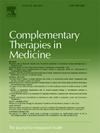在超重和肥胖的乳腺癌患者中,运动作为一种辅助技术可以控制炎症标志物吗?系统回顾和荟萃分析。
IF 3.5
3区 医学
Q1 INTEGRATIVE & COMPLEMENTARY MEDICINE
引用次数: 0
摘要
背景:炎症可导致超重和肥胖女性发生乳腺癌,并影响乳腺癌患者的预后,从而降低乳腺癌患者的治愈率和生存率。作为常规治疗的补充,运动可能对乳腺癌患者有益。然而,关于运动对超重和肥胖乳腺癌女性炎症标志物影响的研究仍不完整。目的:通过系统回顾和荟萃分析,研究运动对超重和肥胖乳腺癌女性炎症标志物的影响。方法:检索Cochrane、Embase、Pubmed、Web of Science、EBSCO等数据库截至2024年5月的文献,筛选符合纳入标准的英文随机对照试验(RCTs)。筛选标准如下:(A)以英文书写;(B)个随机对照试验;(C)超重、肥胖和乳腺癌女性的研究;(D)结局指标:炎症标志物;(E)运动干预的持续时间无限制。结果:共纳入文献14篇,1064名受试者。运动显著降低c反应蛋白(CRP) (MD: -0.52, 95% CI: -0.94 ~ -0.11;P = 0.01;异质性p < 0.1),白细胞介素-6 (IL-6) (MD: -0.87, 95% CI: -1.62 ~ -0.11;P = 0.02;异质性p < 0.1)和瘦素(MD: -0.92, 95% CI: -1.71 ~ -0.13;P = 0.02;异质性p < 0.1)水平和运动显著增加脂联素水平(MD: 0.89, 95% CI: 0.03 ~ 1.75, p = 0.04;异质性p < 0.1),但对肿瘤坏死因子-α (TNF-α)无影响(MD: -0.26, 95% CI: -0.82 ~ 0.29;P = 0.35;异质性p < 0.1)和IL-10 (MD: 0.14, 95% CI: -0.17 ~ 0.45;P = 0.37;异质性p = 0.45)不显著。此外,亚组分析表明,联合训练(CE)可能是最推荐的运动类型,可以减少促炎标志物,增加超重肥胖和患有乳腺癌的女性的抗炎标志物。结论:运动显著降低了超重、肥胖和乳腺癌女性的CRP、IL-6和瘦素水平,总体上增加了脂联素水平。但对TNF-α和IL-10水平的影响不显著。CE可能是减少促炎因子和增加抗炎因子的最推荐的运动类型。因此,本研究认为运动是控制超重和肥胖乳腺癌女性炎症标志物的有效补充方法。未来的研究人员可能会考虑探索运动与饮食控制、体重减轻等因素的综合作用,并制定相应的综合治疗方案。本文章由计算机程序翻译,如有差异,请以英文原文为准。
Can exercise as a complementary technique manage inflammatory markers in women with breast cancer who are overweight and obese? A systematic review and meta-analysis
Background
Inflammation can result in the development of breast cancer in women with overweight and obese, and also affects the outcome and prognosis of breast cancer patients, thereby decreasing the cure and survival rates of breast cancer patients. Exercise may benefit breast cancer patients as a supplement to conventional treatments. However, research on the effects of exercise on inflammatory markers in women with breast cancer who are overweight and obese remains incomplete.
Objective
A systematic review and meta-analysis were used to study the effects of exercise on inflammatory markers in women with breast cancer who are overweight and obese.
Method
Literature up to May 2024 was searched from databases such as Cochrane, Embase, Pubmed, Web of Science, and EBSCO, and English-language randomized controlled trials (RCTs) that met the inclusion criteria were screened. The screening criteria were as follows (A) written in English; (B) RCT; (C) studied in women with overweight obese and breast cancer; (D) outcome measures: inflammatory markers; (E) the duration of the exercise intervention was unlimited.
Results
A total of 14 articles and 1064 participants were included. Exercise significantly reduced C-reactive protein (CRP) (MD: −0.52, 95 % CI: −0.94 to −0.11; p = 0.01; heterogeneity p < 0.1), interleukin-6 (IL-6) (MD: −0.87, 95 % CI: −1.62 to −0.11; p = 0.02; heterogeneity p < 0.1), and leptin (MD: −0.92, 95 % CI: −1.71 to −0.13; p = 0.02; heterogeneity p < 0.1) levels and exercise significantly increased adiponectin levels (MD: 0.89, 95 % CI: 0.03–1.75, p = 0.04; heterogeneity p < 0.1) but had no effect on tumor necrosis factor-α (TNF-α) (MD: −0.26, 95 % CI: −0.82–0.29; p = 0.35; heterogeneity p < 0.1) and IL-10 (MD: 0.14, 95 % CI: −0.17–0.45; p = 0.37; heterogeneity p = 0.45) were not significant. In addition, subgroup analyses suggest that combination training (CE) may be the most recommended type of exercise to decrease pro-inflammatory markers, and increase anti-inflammatory markers in women with overweight obesity, and have breast cancer.
Conclusion
Exercise significantly reduced CRP, IL-6, and leptin levels and overall increased adiponectin levels in women with overweight obese, and breast cancer. However, the effects on TNF-α and IL-10 levels were not significant. CE may be the most recommended type of exercise for reducing pro-inflammatory factors and increasing anti-inflammatory factors. Therefore, this study considers exercise as an effective complementary approach to managing inflammatory markers in women with breast cancer who are overweight and obese. Future researchers may consider exploring the combined effects of exercise and dietary control, weight loss, and other factors, and formulate a comprehensive treatment plan accordingly.
求助全文
通过发布文献求助,成功后即可免费获取论文全文。
去求助
来源期刊

Complementary therapies in medicine
医学-全科医学与补充医学
CiteScore
8.60
自引率
2.80%
发文量
101
审稿时长
112 days
期刊介绍:
Complementary Therapies in Medicine is an international, peer-reviewed journal that has considerable appeal to anyone who seeks objective and critical information on complementary therapies or who wishes to deepen their understanding of these approaches. It will be of particular interest to healthcare practitioners including family practitioners, complementary therapists, nurses, and physiotherapists; to academics including social scientists and CAM researchers; to healthcare managers; and to patients. Complementary Therapies in Medicine aims to publish valid, relevant and rigorous research and serious discussion articles with the main purpose of improving healthcare.
 求助内容:
求助内容: 应助结果提醒方式:
应助结果提醒方式:


